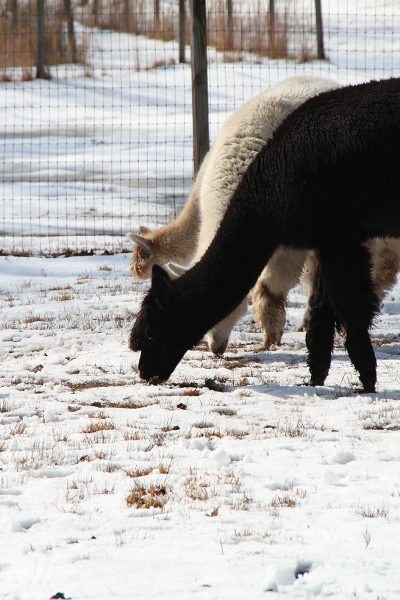Absolutely Alpaca
When Tish Carpinelli learned weaving as part of her art degree in college, she never guessed that it would come in handy when managing an alpaca herd and farm store.
Back in 2007, Tish and her husband Jim Carpinelli found themselves coming home from their day jobs and jumping into the roles of farmers, raising alpacas on their 30-acre property. Alpacas are native to South America, specifically the mountains of Chile, Peru and Bolivia, where they have been kept for their luxurious fleece for thousands of years. A piece of that South American trade is thriving with a small herd on the Carpinellis’ farm, located at 521 Route 47 South.
And with alpaca fleece come a lot of knitting, weaving, spinning, and needle felting.
The couple’s business, Jersey Shore Alpacas, includes a farm store called Absolutely Alpaca, and they also educate the public on their unique niche of agri-tourism through tours, summer camps, craft instruction and community supported agriculture programs.
They both knew the property was something special but never seriously considered a farm. The couple initially started researching raising alpacas as a joke.
“Jim grew up in Brooklyn and he didn’t even know what an alpaca was,” Tish said. “I had always been interested in fiber arts and knitting, but I only knew about their fleece.”
The alpaca industry was introduced commercially in the United States in 1984, and before that they were mostly seen in zoos.
With a little more research, Tish said that she and her husband took a leap of faith and started building a barn and preparing the paddocks. They brought home two females, Andina and Chanel #5, and a male, Cherokee, in February 2007. The first babies, or crias, Annabel Lee and Oliver Twist, were born during a heat wave in July of that same year.
Now they have 17 alpacas, led by the Chilean born and pasture-smart 19-year-old Andina.
“Alpacas normally live to be about 20 years old, so Andina is definitely a senior,” said Tish. “But her smarts haven’t decreased in age. If anything, she’s only gotten smarter. The only difference is that now she sleeps on a heated bed through the winter.”
But for the humans, Alpaca-smarts took some time to develop. Since they weren’t experts, the Carpinellis relied on help from other alpaca farms in the area.
“We worked with the farm in West Cape May and other alpaca farmers for help along the way,” Tish said. “We’re there for each other, especially in emergencies.”
She remembered one incident at a nearby farm where a mother alpaca didn’t have enough milk to nurse her newborn cria.
“Extra alpaca milk isn’t something that you normally just have in your fridge,” she said. Thanks to that relationship with other farms, Tish said they were able to get the needed milk to the newborn.
Even though the Carpinellis have taken classes on safely helping with delivering these unique animals, they have to rely on the advice of specialized veterinarians in Vineland when health issues arise.
When the Carpinellis started to breed their females, they had the joy having 12 healthy crias born on the farm.
“You wait a long time for the babies to arrive,” she said.
Gestation for alpacas is 11 months, and they normally have just one at a time. The last birth on the farm was Très Bon, an alpaca with markings that so closely resemble a panda his nickname is Panda Man.
“The babies are so cute,” Tish added. “Especially when they are pronking.”

She described pronking as a romping jump that alpacas do when they are feeling good. Crias, in particular, do it a lot. Often they’ll run really fast, then end with a pronk, with their heads high, backs straight, and all four feet leaving the ground at the same time.
Alpaca attitudes take some time to get used too, as well. Most aren’t overly cuddly, and while they can develop close friendships in their herd, they can be aloof with strangers. They also can overcome some of that shyness when carrots are on the line.
While the farm has become a full-time job, on top of the Carpinellis’ other full-time jobs, they wouldn’t change it for the world. The spring is spent cleaning up from the harsh winter and getting the alpacas ready for shearing in May. During the early summer, the Carpinellis host a number of summer camps. The farm’s busiest season is in the late summer and fall, when they attend the majority of their local crafts festivals and more people are looking for their products to prepare for winter.
They are open for farm tours and store hours to the public every Saturday and by appointment. The only time off are the months of January and February. Tish said that during that time it might be nice to get a day away.
“We’ll probably spend most of it at a home improvement store planning for another project,” she said with a laugh.

When breeding alpacas, Tish said the breed standard is very strict and the goal is to bring improvement to the bloodline. All of the alpacas that are bred have pedigrees and papers and are registered with the National Alpaca Farm and Breeders Association.
New Jersey has 71 businesses belonging to the farm and breeders association.
Eight years ago, the economic environment was perfect for a growing agricultural industry, such as alpaca farms. Farmers could sell breeding female alpaca for $10,000 to $15,000 and pay top dollar for stud rights.
Tish said that the economic downturn caused those numbers to drop significantly. The slow economy was part of the reason the Carpinellis decided to keep their herd at 17 and focus on the fleece.
Absolutely Alpaca is the couple’s store, which is located at their farm and carries a variety of handmade goods, including scarves, gloves, hats, sweaters, socks, toys and skeins of yarn.
“The yarn is really soft and made of thin fibers that don’t have barbs or contain lanolin like regular wool,” said Tish. “It is measured in microns and certain alpacas can retain high-quality softness to their fleece even when they are adults.”

The farm has hosted local knitting groups, and the yarn is so popular that they have implemented a frequent buyers program. They also host a studio session in the store where, for the purchase of materials, the Carpinellis will offer some instruction in knitting and needle felting. For interested small groups, they can even bring out the large floor loom.
Currently, the farm store has a large supply of yarn, including baby alpaca fleece, which is prized for superior quality and softness. Carpinelli said the brand is called Blue Sky Alpaca and is rated as one of the highest grades. It is often used in products for children and people with skin sensitivities.
In May, when the herd is sheared for their wool, Tish said the fleece can take up to nine months to return from the mill. While some of their product is higher quality, certain alpacas can make lesser-quality, rougher feeling fleece and those pieces are often used to make lining for boots or bird’s nests.
The store also carries fair-trade baby, children’s and adult items made exclusively for them by Efata Ministries in Lima, Peru. Efata maintains a Christian school and orphanage for deaf children, as well as church-based ministries.
“My husband and I wanted the business to give back to the people of Peru,” said Tish. “We’ve learned so much from their culture through the alpacas that we wanted to do what we can.”

The couple also wanted to give both locals and visitors an opportunity to learn more about farm life through community supported agricultural (CSA) program and summer day camps.
During the summer camps, which are open to ages nine to 16, kids will spend a portion of the week learning about chores, handling of the alpacas by leading them on halter through an obstacle course. They also learn about different crafts that can be made with alpaca fleece.
With more and more people wanting to learn about local agriculture, hand-made and sustainable products, the Carpinellis are looking forward to sharing what they’ve learned about these unique animals with a growing audience.
“I’ve taught a mother and daughter how to knit and teenagers how to do needle felting,” Tish said.

One CSA member purchased two alpacas from the Carpinelli’s farm and now boards them on the property.
This also relayed a story of a child with special needs who waits weekly to visit the farm so he can spend time with the alpacas. Another visitor stopped by the farm after her father had passed away because she had so many fond memories spending time with him at the farm.
“We love the animals,” said Carpinelli, “but we really love the people we have met through this process.”



